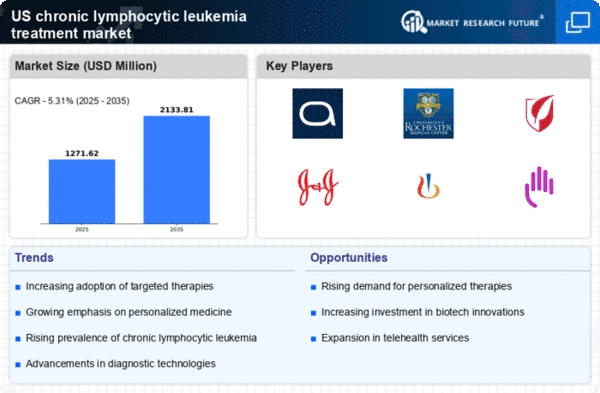Growing Patient Population
The chronic lymphocytic-leukemia-treatment market is experiencing growth due to an increasing patient population. As the incidence of chronic lymphocytic leukemia (CLL) rises, driven by factors such as an aging demographic and improved diagnostic capabilities, the demand for effective treatment options intensifies. In the US, the estimated prevalence of CLL is projected to reach approximately 20,000 new cases annually. This growing patient base necessitates advancements in treatment modalities, thereby propelling market expansion. Pharmaceutical companies are likely to invest in research and development to cater to this rising demand, which could lead to innovative therapies entering the market. Consequently, the chronic lymphocytic-leukemia-treatment market is poised for significant growth as healthcare providers seek to address the needs of an expanding patient population.
Increased Awareness and Education
There is a growing emphasis on awareness and education regarding chronic lymphocytic leukemia, which is positively impacting the treatment market. Healthcare organizations and advocacy groups are actively working to educate both patients and healthcare providers about CLL, its symptoms, and available treatment options. This increased awareness is likely to lead to earlier diagnosis and treatment initiation, which can improve patient outcomes. As more individuals become informed about CLL, the demand for effective therapies is expected to rise. The chronic lymphocytic-leukemia-treatment market may benefit from this trend, as healthcare providers are better equipped to discuss treatment options with patients, ultimately driving market growth.
Regulatory Support for New Treatments
Regulatory bodies in the US are actively supporting the development and approval of new treatments for chronic lymphocytic leukemia. Initiatives aimed at expediting the review process for innovative therapies, such as the FDA's Breakthrough Therapy designation, are likely to enhance the market landscape. This regulatory support encourages pharmaceutical companies to invest in research and development, potentially leading to a wider array of treatment options for patients. The chronic lymphocytic-leukemia-treatment market may experience accelerated growth as new therapies gain approval and enter the market, providing healthcare professionals with more tools to combat this disease. Furthermore, the emphasis on patient-centric approaches in regulatory frameworks may lead to treatments that are better tailored to individual patient needs.
Advancements in Treatment Technologies
Technological advancements play a pivotal role in shaping the chronic lymphocytic-leukemia-treatment market. Innovations in treatment methodologies, such as the development of novel monoclonal antibodies and small molecule inhibitors, have transformed the therapeutic landscape for CLL. For instance, the introduction of targeted therapies has shown promising results in improving patient outcomes. The market is witnessing a surge in the adoption of these advanced treatment options, which are often associated with fewer side effects compared to traditional chemotherapy. As a result, healthcare providers are increasingly inclined to incorporate these technologies into their treatment protocols. The chronic lymphocytic-leukemia-treatment market is likely to benefit from ongoing research and development efforts, which may yield even more effective therapies in the near future.
Rising Investment in Oncology Research
Investment in oncology research is on the rise, which is likely to have a profound impact on the chronic lymphocytic-leukemia-treatment market. Pharmaceutical companies and research institutions are allocating substantial resources to explore new therapeutic avenues for CLL. This influx of funding is expected to accelerate the development of innovative treatment options, including combination therapies and personalized medicine approaches. As research progresses, the chronic lymphocytic-leukemia-treatment market may witness the introduction of groundbreaking therapies that could significantly alter the treatment landscape. The commitment to advancing oncology research reflects a broader trend in the healthcare sector, where the focus on cancer treatment continues to intensify.
















